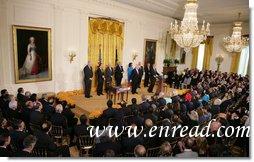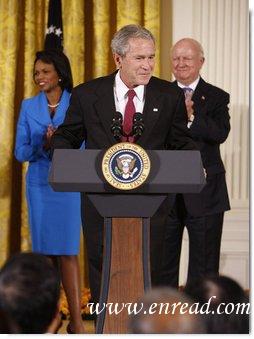President Bush Signs H.R. 7081, the United States-India Nuclear Cooperation Appr
- 指点迷津
- 2024-11-29
- 7
 Even though the United States and India are separated by half the globe, we are natural partners as we head into the 21st century. Both our nations emerged from a colonial past to establish vibrant6 democracies. We have welcomed investment and private enterprise to become leaders in the global economy. We have stood against the dangers posed by extremists, who have carried out attacks in both our countries. We have demonstrated that we cherish liberty, honor human dignity, and respect the rule of law.,Despite these common interests and values, it was not long ago that relations between the United States and India were strained. In recent years, we've worked to transform our relationship into a strong strategic partnership7. One area where we saw tremendous potential for cooperation is energy. As our economies have grown, our demands for energy have grown, as well. It's become increasingly clear that we need to generate that energy in ways that are safe and clean and secure.,One energy source that can generate large amounts of electricity with zero emissions8 of air pollution or greenhouse gases is nuclear power. So three years ago, Prime Minister Singh -- who I consider a dear friend -- and I resolved to work together on a landmark9 agreement paving the way for our nations to cooperate on nuclear power. By undertaking10 new cooperation on civil nuclear energy, India will be able to count on a reliable fuel supply for its civilian11 reactors12, meet the energy demands of its people, and reduce its independence [sic] on fossil fuels.,For our part, the United States will gain access to a growing market for civilian nuclear technologies and materials, that will help American businesses create more jobs for our people here at home.,Our agreement will also strengthen global nonproliferation efforts. India has committed to operate its civil nuclear energy program under the safeguards of the International Atomic Energy Agency and other international guidelines. India will continue to build on its strong record of responsibility in operating its nuclear facilities. And India and the United States will cooperate more closely to keep the world's most dangerous weapons out of the hands of extremists and terrorists.,
Even though the United States and India are separated by half the globe, we are natural partners as we head into the 21st century. Both our nations emerged from a colonial past to establish vibrant6 democracies. We have welcomed investment and private enterprise to become leaders in the global economy. We have stood against the dangers posed by extremists, who have carried out attacks in both our countries. We have demonstrated that we cherish liberty, honor human dignity, and respect the rule of law.,Despite these common interests and values, it was not long ago that relations between the United States and India were strained. In recent years, we've worked to transform our relationship into a strong strategic partnership7. One area where we saw tremendous potential for cooperation is energy. As our economies have grown, our demands for energy have grown, as well. It's become increasingly clear that we need to generate that energy in ways that are safe and clean and secure.,One energy source that can generate large amounts of electricity with zero emissions8 of air pollution or greenhouse gases is nuclear power. So three years ago, Prime Minister Singh -- who I consider a dear friend -- and I resolved to work together on a landmark9 agreement paving the way for our nations to cooperate on nuclear power. By undertaking10 new cooperation on civil nuclear energy, India will be able to count on a reliable fuel supply for its civilian11 reactors12, meet the energy demands of its people, and reduce its independence [sic] on fossil fuels.,For our part, the United States will gain access to a growing market for civilian nuclear technologies and materials, that will help American businesses create more jobs for our people here at home.,Our agreement will also strengthen global nonproliferation efforts. India has committed to operate its civil nuclear energy program under the safeguards of the International Atomic Energy Agency and other international guidelines. India will continue to build on its strong record of responsibility in operating its nuclear facilities. And India and the United States will cooperate more closely to keep the world's most dangerous weapons out of the hands of extremists and terrorists., The bill I sign today approves the 123 agreement I submitted to Congress -- and establishes the legal framework for that agreement to come into effect. The bill makes clear that our agreement with India is consistent with the Atomic Energy Act and other elements of U.S. law. By passing this legislation, my administration and Congress demonstrate our common view that nuclear cooperation is in the interest of both the United States and India.,The legislation makes no changes to the terms of the 123 agreement I submitted to Congress. It enables me to bring that agreement into force and to accept on behalf of the United States all the obligations that are part of the agreement. The legislation does not change the fuel assurance commitments that the United States government has made to the government of India, as recorded in the 123 agreement. The agreement also grants India "advance consent to reprocessing" -- which will be brought into effect upon the conclusion of arrangements and procedures for a dedicated13 reprocessing facility under IAEA safeguards.,This agreement sends a signal to the world: Nations that follow the path of democracy and responsible behavior will find a friend in the United States of America. (Applause.) The American people are proud of our strong relationship with India. And I am confident that the friendship between our two nations will grow even closer in the years ahead.,Laura and I send our best wishes to the hundreds of millions of people in India and around the world who will begin celebrating the ancient festival of Diwali later this month. (Applause.) As we offer our prayers for a happy new year, we can be thankful that the relationship between the United States and India has never been more vibrant and more hopeful.,And it's now my honor to sign the United States-India Nuclear Cooperation Approval and Nonproliferation Enhancement Act. (Applause.),(The bill is signed.) (Applause.),
The bill I sign today approves the 123 agreement I submitted to Congress -- and establishes the legal framework for that agreement to come into effect. The bill makes clear that our agreement with India is consistent with the Atomic Energy Act and other elements of U.S. law. By passing this legislation, my administration and Congress demonstrate our common view that nuclear cooperation is in the interest of both the United States and India.,The legislation makes no changes to the terms of the 123 agreement I submitted to Congress. It enables me to bring that agreement into force and to accept on behalf of the United States all the obligations that are part of the agreement. The legislation does not change the fuel assurance commitments that the United States government has made to the government of India, as recorded in the 123 agreement. The agreement also grants India "advance consent to reprocessing" -- which will be brought into effect upon the conclusion of arrangements and procedures for a dedicated13 reprocessing facility under IAEA safeguards.,This agreement sends a signal to the world: Nations that follow the path of democracy and responsible behavior will find a friend in the United States of America. (Applause.) The American people are proud of our strong relationship with India. And I am confident that the friendship between our two nations will grow even closer in the years ahead.,Laura and I send our best wishes to the hundreds of millions of people in India and around the world who will begin celebrating the ancient festival of Diwali later this month. (Applause.) As we offer our prayers for a happy new year, we can be thankful that the relationship between the United States and India has never been more vibrant and more hopeful.,And it's now my honor to sign the United States-India Nuclear Cooperation Approval and Nonproliferation Enhancement Act. (Applause.),(The bill is signed.) (Applause.),President Bush Visits the United States Holocaust Memorial M
President Bush Meets with Prime Minister Blair of the United
President Bush Signs H.R. 7222, the Andean Trade Preference Act Extension
President Bush Participates in United States Embassy Greeting, Discusses Malaria
President Bush Signs H.R. 493, the Genetic Information Nondiscrimination Act of
President Bush Signs H.R. 2642, the Supplemental Appropriations Act, 2008
The President and Mrs. Bush to Host Lunch for the United Nations Secretary-Gener
President Bush Addresses The United Nations General Assembly
President Bush Delivers Commencement Address at United States Air Force Academy
President Bush Visits the Economic Club of New York
President Bush Signs Executive Order to Protect Striped Bass and Red Drum Fish P
本文由明日于2024-11-29发表在生活百科-红苹果乐园,如有疑问,请联系我们。
文章摘自:http://hpgly.com/post/22524.html










![[流言板]雷尔森传中,穆科科近距离射门打飞](/zb_users/upload/2024/12/3111596453046865195.gif)
发表评论